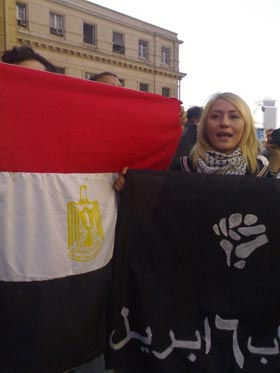"Tiaret: the town hall's headquarters besieged by dozens of Young people", title of the newspaper Liberté of the 1st of February 2009. The daily newspaper recounts the fact that in this locality situated in the East of the capital city, young people have assaulted the town hall to protest against their life conditions and particularly against unemployment. The leader of Daïra (the sub prefect) has promised to take their demands into consideration. In Seddouk (300km to the East of Algiers): secondary students are angry against the exclusion of their mates and against schooling conditions. Bel Abbès: 12 youngsters kept in custody due to riots. These brief articles are nearly mundane in Algerian press. They are placed with brief news and don't interest anyone anymore. The Algerian youth's dismay - 47.27% of the 35.7 million Algerians - is trivialized between two big riots, two tragedies. Like these youngsters whose bodies were found off the Spanish coast after a failed attempt of illegal immigration. According to the Algerian coast guards, in 2008, they were 4000 to attempt the trip. They were probably more in 2009.
These brief articles are nearly mundane in Algerian press. They are placed with brief news and don't interest anyone anymore. The Algerian youth's dismay - 47.27% of the 35.7 million Algerians - is trivialized between two big riots, two tragedies. Like these youngsters whose bodies were found off the Spanish coast after a failed attempt of illegal immigration. According to the Algerian coast guards, in 2008, they were 4000 to attempt the trip. They were probably more in 2009.
Interrogated on the subject, in December 2009, the Ministry of Youth had replied without batting an eyelid "we have not managed to identify the reasons why these young people want to leave". Nevertheless, the government has increased the organisation of meetings and workshops on youth and surveys on the subject.
In 2007, a survey commissioned by the National Centre for Research and Analyses and Planning (Centre national d'études et d'analyse pour la planification - CENEAP(1)) had revealed that for 62.8% of the young people who go to school, the "future is blurred", 58% have no activity and 90.6% are members of no association. Paradoxically, nearly half of the presidents of associations are less than 40 years old. The majority are bilingual, academics, and master issues dealing with youth. They all have reported the danger of drug addiction to the government. Due to lack of financial means, they find it hard to struggle against this flaw in the framework of their associations(2).
During a meeting between the walis (prefects) and the government, the CENEAP had also given alarming statistics on the loss of schooling indicating that 48% of children who go to school, interrupt their studies at primary school level. 32.5 % interrupt secondary school. 15 to 29-year old unemployment represents 70% of the global unemployed.
In 2009, the crisis did not spare Algeria. It has accentuated the deterioration of youth socioeconomic conditions. Beyond these parameters, Algerian youth is above all a victim of public policies and programs. According to the CENEAP, the latter can be described by their weakness in listening capacities, in observation, of participation, in evaluation, in information and forecasting. The government lacks coherence and coordination in the implementation of these policies.
Even without these specialists' analysis, the boredom and dismay of young people are visible in Algerian streets. The rare libraries are replaced by all kinds of shops. Sports complexes are falling apart and the access to world cinema passes through the bad quality copies of pirated films. In a recent survey carried out by Alpha Publishers, it emerges that 80% of students have never read a book during their studies. When it comes to university, professors including Ahmed Rouadjia have denounced the trafficking of diplomas and plagiarism that inflict upon Algerian university. On the 1st of February 2010, Rouadjia writes about education content in El Watan (an Algerian newspaper) "the same definitions of notions and concepts that some pretend to clarify to their students obey more to an ideological indoctrination logic with its stream of sentimental affects of the "Arab speaking", "Islamic" or cheap patriotic type than to the neutral and cold distance that the rigor of the Cartesian method implies."
Besides, the instrumentalisation of the youth patriotic feeling by the Algerian government has reached its paroxysm during the African cup's qualification games. Reduced flight tickets to go to Sudan then to Angola, passports' delivery in a few minutes and media publicity. All means have been used to make young people forget that the majority of the national football team is made up of franco-algerians who are trained and live in Europe and that due to lack of financial means and infrastructure, sports practice in Algeria is a minority. Additionally, to make young people forget the strikes that have been paralysing schools and hospitals for months.
-
(1) www.ceneap.com.dz
(2) According to the judiciary police of the national gendarmerie more than64 tons of drugs have been seized in 2009. They also reveal that more and more pupils and students are drug addicts.
young mediterraneans
«I’m Young But I Feel A Hundred Years Old»
What do young Egyptians aspire for today? The generation between 18-29 years of age is ageing prematurely. Young Egyptians don’t dream of fulfilling their dreams anymore or travelling to discover the world. Their ambitions are threatened and their dreams are diminishing due to increasingly bad economic conditions, which haven’t spared any field.
further coverage of this story
Hak odaklı, çok sesli, bağımsız gazeteciliği güçlendirmek için bianet desteğinizi bekliyor.




